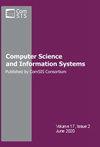基于概率本体的冠状病毒病诊断预测的概率推理
IF 1.2
4区 计算机科学
Q4 COMPUTER SCIENCE, INFORMATION SYSTEMS
引用次数: 0
摘要
世界卫生组织宣布新型冠状病毒为大流行。预测COVID-19的诊断对于疾病的治疗和控制至关重要。纸吗?其主要目的是利用概率本体来预测COVID-19的诊断,以解决知识的随机性和不完全性。我们的方法首先通过提取症状和风险因素,构建COVID-19本体的实体、属性和关系。通过创建多实体贝叶斯网络,确定其组成部分,将不同节点作为概率分布链接到各个节点,从而开发出COVID-19本体的概率成分。我们使用概率参考来预测COVID-19的诊断,使用情境特异性贝叶斯网络(SSBN)。为了验证该解决方案,对真实案例进行了实验研究,比较了现有机器学习方法的结果,我们的解决方案呈现出令人鼓舞的结果,从而实现了快速医疗援助。本文章由计算机程序翻译,如有差异,请以英文原文为准。
Probabilistic reasoning for diagnosis prediction of Coronavirus disease based on probabilistic ontology
The novel Coronavirus has been declared a pandemic by the World Health Organization (WHO). Predicting the diagnosis of COVID-19 is essential for disease cure and control. The paper?s main aim is to predict the COVID-19 diagnosis using probabilistic ontologies to address the randomness and incomplete ness of knowledge. Our approach begins with constructing the entities, attributes, and relationships of COVID-19 ontology, by extracting symptoms and risk factors. The probabilistic components of COVID-19 ontology are developed by creating a Multi-Entity Bayesian Network, then determining its components, with the different nodes, as probability distribution linked to various nodes. We use probabilistic in ference for predicting COVID-19 diagnosis, using the Situation-Specific Bayesian Network (SSBN). To validate the solution, an experimental study is conducted on real cases, comparing the results of existing machine learning methods, our solution presents an encouraging result and, therefore enables fast medical assistance.
求助全文
通过发布文献求助,成功后即可免费获取论文全文。
去求助
来源期刊

Computer Science and Information Systems
COMPUTER SCIENCE, INFORMATION SYSTEMS-COMPUTER SCIENCE, SOFTWARE ENGINEERING
CiteScore
2.30
自引率
21.40%
发文量
76
审稿时长
7.5 months
期刊介绍:
About the journal
Home page
Contact information
Aims and scope
Indexing information
Editorial policies
ComSIS consortium
Journal boards
Managing board
For authors
Information for contributors
Paper submission
Article submission through OJS
Copyright transfer form
Download section
For readers
Forthcoming articles
Current issue
Archive
Subscription
For reviewers
View and review submissions
News
Journal''s Facebook page
Call for special issue
New issue notification
Aims and scope
Computer Science and Information Systems (ComSIS) is an international refereed journal, published in Serbia. The objective of ComSIS is to communicate important research and development results in the areas of computer science, software engineering, and information systems.
 求助内容:
求助内容: 应助结果提醒方式:
应助结果提醒方式:


